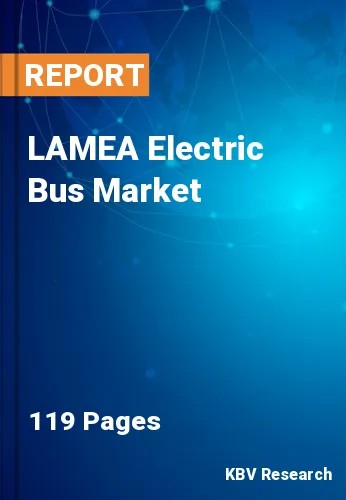Chapter 1. Market Scope & Methodology
1.1 Market Definition
1.2 Objectives
1.3 Market Scope
1.4 Segmentation
1.4.1 LAMEA Electric Bus Market, by Battery Type
1.4.2 LAMEA Electric Bus Market, by Vehicle
1.4.3 LAMEA Electric Bus Market, by Application
1.4.4 LAMEA Electric Bus Market, by End-Use
1.4.5 LAMEA Electric Bus Market, by Country
1.5 Methodology for the research
Chapter 2. Market Overview
2.1 Introduction
2.1.1 Overview
2.1.1.1 Market Composition and Scenario
2.2 Key Factors Impacting the Market
2.2.1 Market Drivers
2.2.2 Market Restraints
Chapter 3. Competition Analysis - Global
3.1 KBV Cardinal Matrix
3.2 Recent Industry Wide Strategic Developments
3.2.1 Partnerships, Collaborations and Agreements
3.2.2 Product Launches and Product Expansions
3.2.3 Acquisition and Mergers
3.3 Top Winning Strategies
3.3.1 Key Leading Strategies: Percentage Distribution (2019-2023)
3.3.2 Key Strategic Move: (Product Launches and Product Expansions: 2019, Apr – 2023, Jun) Leading Players
Chapter 4. LAMEA Electric Bus Market by Battery Type
4.1 LAMEA Lithium Iron Phosphate Market by Country
4.2 LAMEA Lithium Nickel Manganese Cobalt Oxide Market by Country
Chapter 5. LAMEA Electric Bus Market by Vehicle
5.1 LAMEA Battery Electric Vehicle Market by Country
5.2 LAMEA Plug-in Hybrid Electric Vehicle Market by Country
5.3 LAMEA Fuel Cell Electric Vehicle Market by Country
Chapter 6. LAMEA Electric Bus Market by Application
6.1 LAMEA Intercity Market by Country
6.2 LAMEA Intracity Market by Country
Chapter 7. LAMEA Electric Bus Market by End-use
7.1 LAMEA Public Market by Country
7.2 LAMEA Private Market by Country
Chapter 8. LAMEA Electric Bus Market by Country
8.1 Brazil Electric Bus Market
8.1.1 Brazil Electric Bus Market by Battery Type
8.1.2 Brazil Electric Bus Market by Vehicle
8.1.3 Brazil Electric Bus Market by Application
8.1.4 Brazil Electric Bus Market by End-use
8.2 Argentina Electric Bus Market
8.2.1 Argentina Electric Bus Market by Battery Type
8.2.2 Argentina Electric Bus Market by Vehicle
8.2.3 Argentina Electric Bus Market by Application
8.2.4 Argentina Electric Bus Market by End-use
8.3 UAE Electric Bus Market
8.3.1 UAE Electric Bus Market by Battery Type
8.3.2 UAE Electric Bus Market by Vehicle
8.3.3 UAE Electric Bus Market by Application
8.3.4 UAE Electric Bus Market by End-use
8.4 Saudi Arabia Electric Bus Market
8.4.1 Saudi Arabia Electric Bus Market by Battery Type
8.4.2 Saudi Arabia Electric Bus Market by Vehicle
8.4.3 Saudi Arabia Electric Bus Market by Application
8.4.4 Saudi Arabia Electric Bus Market by End-use
8.5 South Africa Electric Bus Market
8.5.1 South Africa Electric Bus Market by Battery Type
8.5.2 South Africa Electric Bus Market by Vehicle
8.5.3 South Africa Electric Bus Market by Application
8.5.4 South Africa Electric Bus Market by End-use
8.6 Nigeria Electric Bus Market
8.6.1 Nigeria Electric Bus Market by Battery Type
8.6.2 Nigeria Electric Bus Market by Vehicle
8.6.3 Nigeria Electric Bus Market by Application
8.6.4 Nigeria Electric Bus Market by End-use
8.7 Rest of LAMEA Electric Bus Market
8.7.1 Rest of LAMEA Electric Bus Market by Battery Type
8.7.2 Rest of LAMEA Electric Bus Market by Vehicle
8.7.3 Rest of LAMEA Electric Bus Market by Application
8.7.4 Rest of LAMEA Electric Bus Market by End-use
Chapter 9. Company Profiles
9.1 Solaris Bus & Coach sp. z o.o. (Construcciones y Auxiliar de Ferrocarriles, S.A.)
9.1.1 Company Overview
9.1.2 Financial Analysis
9.1.3 Regional Analysis
9.1.4 Recent strategies and developments:
9.1.4.1 Product Launches and Product Expansions:
9.2 Ashok Leyland Limited (Hinduja Group Ltd.)
9.2.1 Company Overview
9.2.2 Financial Analysis
9.2.3 Regional Analysis
9.2.4 Research & Development Expenses
9.2.5 Recent strategies and developments:
9.2.5.1 Product Launches and Product Expansions:
9.3 Mercedes-Benz Group AG (Daimler Truck Holding AG)
9.3.1 Company Overview
9.3.2 Financial Analysis
9.3.3 Segmental and Regional Analysis
9.3.4 Research & Development Expense
9.3.5 Recent strategies and developments:
9.3.5.1 Partnerships, Collaborations, and Agreements:
9.3.5.2 Product Launches and Product Expansions:
9.3.5.3 Geographical Expansions:
9.3.6 SWOT Analysis
9.4 Yutong Bus Co., Ltd.
9.4.1 Company Overview
9.4.2 Recent strategies and developments:
9.4.2.1 Product Launches and Product Expansions:
9.5 BYD Company Ltd.
9.5.1 Company Overview
9.5.2 Financial Analysis
9.5.3 Regional Analysis
9.5.4 Research & Development Expense
9.5.5 Recent strategies and developments:
9.5.5.1 Partnerships, Collaborations, and Agreements:
9.5.5.2 Product Launches and Product Expansions:
9.6 Volvo Group
9.6.1 Company Overview
9.6.2 Financial Analysis
9.6.3 Segmental and Regional Analysis
9.6.4 Research & Development Expense
9.6.5 Recent strategies and developments:
9.6.5.1 Partnerships, Collaborations, and Agreements:
9.6.6 SWOT Analysis
9.7 Volkswagen AG
9.7.1 Company Overview
9.7.2 Financial Analysis
9.7.3 Segmental and Regional Analysis
9.7.4 Research & Development Expense
9.7.5 Recent strategies and developments:
9.7.5.1 Partnerships, Collaborations, and Agreements:
9.7.5.2 Product Launches and Product Expansions:
9.7.6 SWOT Analysis
9.8 Nissan Motor Corporation
9.8.1 Company Overview
9.8.2 Financial Analysis
9.8.3 Segmental and Regional Analysis
9.8.4 Research & Development Expenses
9.8.5 SWOT Analysis
9.9 Tata Motors Limited (Tata Group)
9.9.1 Company Overview
9.9.2 Financial Analysis
9.9.3 Segmental and Regional Analysis
9.9.4 Research & Development Expenses
9.9.5 Recent strategies and developments:
9.9.5.1 Partnerships, Collaborations, and Agreements:
9.10. Hyundai Motor Company
9.10.1 Company Overview
9.10.2 Financial Analysis
9.10.3 Segmental and Regional Analysis
9.10.4 Research & Development Expense
9.10.5 Recent strategies and developments:
9.10.5.1 Partnerships, Collaborations, and Agreements:
9.10.5.2 Product Launches and Product Expansions:
9.10.6 SWOT Analysis

